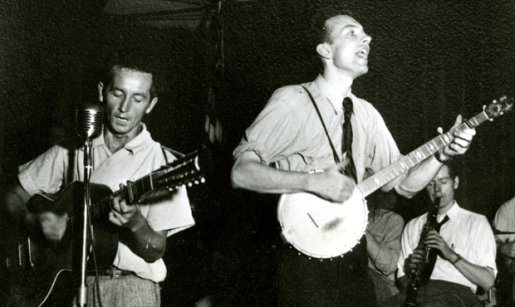It is hard to feel sorrow for a man who lived such a long wonderful life and brought so much joy to so many people along the way. Pete Seeger is an American icon, a figure that straddled no less than five generations of music, keeping the spirit of Woody Guthrie alive for a younger generation of folk singers to revel in, including Woody's son, Arlo, with whom Pete often sang. Pete gave a young Bob Dylan entry into the folk music world beyond the village, although he too felt betrayed when Dylan went electric at Newport in '65. And, Pete was there for Bruce Springsteen as well, who did perhaps the most marvelous tribute to the old master in the Seeger Sessions a few years back, giving folk music a sense of pure joy, as in this recording at St. Luke's. But, perhaps the warmest moment of all was Pete Seeger being honored by Arlo and others at Kennedy Center, singing his classic If I Had a Hammer.
The thing about Pete is that he welcomed everyone into his midst. Larger than life seems an understatement in his case, as the songs he sang kept the promise alive through difficult times stretching back to the labor movement of the 40s. He helped create an awareness far outside the United States, drawing on folk ballads from all around the world to highlight injustices far and wide.
While he was outspoken in his political views, earning him many enemies, his music reached deep into the American repertoire, defying Congressional movement who felt his protest ballads were somehow "Un-American." Work songs had long been part of American folk and Pete simply transformed them into labor songs. This ability to invert traditional ballads and give them a political charge is probably what made him seem "dangerous" to conservatives in the 50s.
By the 60s, Seeger was enjoyed record contracts with Columbia and other major record companies, but he didn't allow himself to be commercialized. He used his success to champion his causes, touring the world and bringing American folk music to whole new audiences. There is even a version of Goodnight Irene in Lithuanian.
It's hard not to love Pete today, even if you are an old Bircher. The guy never really softened with age, but his durability is something anyone can respect. At nearly 90, he sang with Bruce Springteen at Obama's inauguration in 2009. Appropriately enough, This Land is Your Land.



ReplyDeletePete Seeger - a true giant in the music world and a patriotic American. Will be sorely missed.
It is a great loss. I really enjoyed the relationship he forged with Bruce. The Boss took a moment to recognize Pete Seeger in concert,
ReplyDeletehttp://www.youtube.com/watch?v=QJ6xXNwwLxc